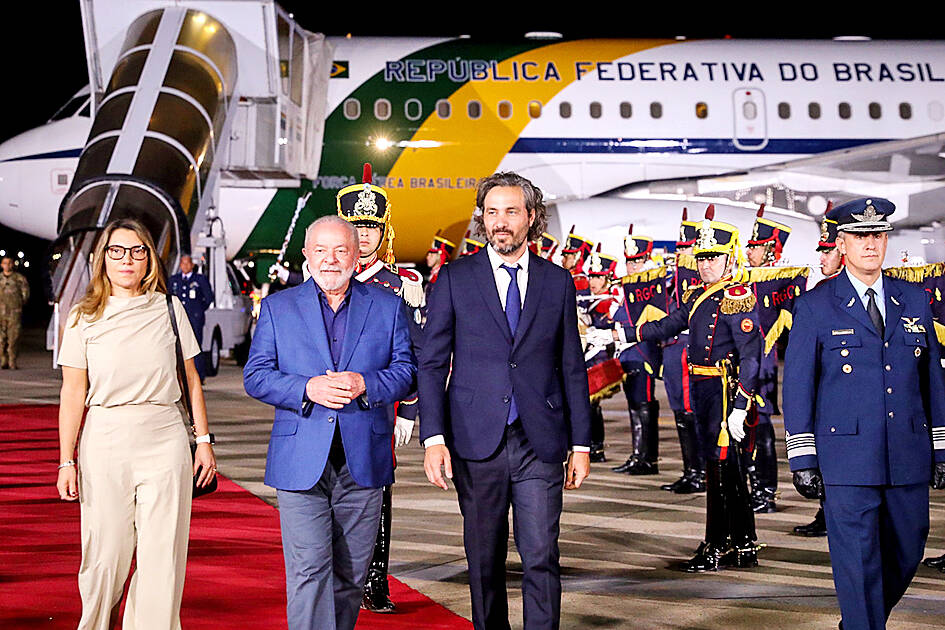Brazil and Argentina aim for greater economic integration, including the development of a common currency, Brazilian President Luiz Inacio Lula da Silva and Argentine leader Alberto Fernandez said in a joint article they wrote.
“We intend to overcome the barriers to our exchanges, simplify and modernize the rules and encourage the use of local currencies,” says the text published on the Argentine Web site Perfil.
“We also decided to advance discussions on a common South American currency that can be used for both financial and commercial flows, reducing costs operations and our external vulnerability,” the article said.

Photo: EPA-EFE
The idea of a common currency was raised originally in an article written last year by Fernando Haddad and Gabriel Galipolo, now Brazil’s finance minister and his executive secretary, respectively, and was mentioned by Lula during the campaign.
Lula chose Argentina for his inaugural international trip since taking office, keeping with the tradition of first visiting Brazil’s largest trading partner in the region. That follows four years of tense relations during the government of former Brazilian president Jair Bolsonaro.
Lula’s trip to neighboring Argentina also marks the return of Brazil to the Community of Latin American and Caribbean States, which Brazil left in 2019 under order from Bolsonaro, who refused to participate in the regional group due to the presence of Cuba and Venezuela.
Both presidents emphasized the need for a good relationship between Argentina and Brazil to strengthen regional integration, according to the article.
The leaders also emphasized strengthening the Mercosur trade bloc, which includes Argentina, Brazil, Paraguay and Uruguay, and which Brazilian Finance Minister Haddad recently lamented has been abandoned in recent years.
“Together with our partners, we want Mercosur to constitute a platform for our effective integration into the world, through the joint negotiation of balanced trade agreements that respond to our strategic development objectives,” both presidents said.
The Financial Times reported that the neighboring nations will announce this week they are starting preparatory work on a common currency.
The plan, set to be discussed at a summit in Buenos Aires this week, would focus on how a new currency, which Brazil suggests calling the “sur” (south), could boost regional trade and reduce reliance on the US dollar, the FT reported, citing officials.
Politicians from both countries have discussed the idea already in 2019, but met with pushback from Brazil’s central bank at the time.
Initially starting as a bilateral project, the initiative would later be extended to invite other Latin American nations, the report said, adding an official announcement was expected during Lula’s visit to Argentina that started on Sunday night.

PATENTS: MediaTek Inc said it would not comment on ongoing legal cases, but does not expect the legal action by Huawei to affect its business operations Smartphone integrated chips designer MediaTek Inc (聯發科) on Friday said that a lawsuit filed by Chinese smartphone brand Huawei Technologies Co (華為) over alleged patent infringements would have little impact on its operations. In an announcement posted on the Taiwan Stock Exchange, MediaTek said that it would not comment on an ongoing legal case. However, the company said that Huawei’s legal action would have little impact on its operations. MediaTek’s statement came after China-based PRIP Research said on Thursday that Huawei filed a lawsuit with a Chinese district court claiming that MediaTek infringed on its patents. The infringement mentioned in the lawsuit likely involved

Taipei is today suspending work, classes and its US$2.4 trillion stock market as Typhoon Gaemi approaches Taiwan with strong winds and heavy rain. The nation is not conducting securities, currency or fixed income trading, statements from its stock and currency exchanges said. Authorities had yesterday issued a warning that the storm could affect people on land and canceled some ship crossings and domestic flights. Taiwan Semiconductor Manufacturing Co (TSMC, 台積電) expects its local chipmaking fabs to maintain normal production, the company said in an e-mailed statement. The main chipmaker for Apple Inc and Nvidia Corp said it has activated routine typhoon alert

GROWTH: TSMC increased its projected revenue growth for this year to more than 25 percent, citing stronger-than-expected demand for AI devices and smartphones The Taiwan Institute of Economic Research (TIER, 台灣經濟研究院) yesterday raised its forecast for Taiwan’s GDP growth this year from 3.29 percent to 3.85 percent, as exports and private investment recovered faster than it predicted three months ago. The Taipei-based think tank also expects that Taiwan would see a 8.19 percent increase in exports this year, better than the 7.55 percent it projected in April, as US technology giants spent more money on artificial intelligence (AI) infrastructure and development. “There will be more AI servers going forward, but it remains to be seen if the momentum would extend to personal computers, smartphones and

Catastrophic computer outages caused by a software update from one company have once again exposed the dangers of global technological dependence on a handful of players, experts said on Friday. A flawed update sent out by the little-known security firm CrowdStrike Holdings Inc brought airlines, TV stations and myriad other aspects of daily life to a standstill. The outages affected companies or individuals that use CrowdStrike on the Microsoft Inc’s Windows platform. When they applied the update, the incompatible software crashed computers into a frozen state known as the “blue screen of death.” “Today CrowdStrike has become a household name, but not in